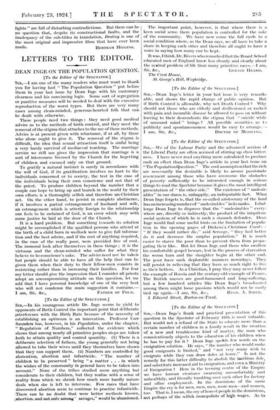- LETTERS TO THE EDITOR.
DEAN INGE ON THE POPULATION QUESTION.
[To the Editor of the SPECTATOR.]
`Snr,—I am one of the many readers who must want to thank you for having had " The Population Question " put before them in your last issue by Dean Inge with his customary clearness and his convincing logic. Some sort of segregation or punitive measures will be needed to deal with the excessive reproduction of the worst types. But there are very many cases among clean-minded, generous-hearted folk that can be dealt with otherwise.
These people need two things : they need good medical advice as to the methods of birth control, and they need the removal of the stigma that attaches to the use of those methods. Advice is at present given with reluctance, if at all, by those who alone ought to give it. The removal of the stigma is difficult, the idea that sexual attraction itself is sinful being a very hardy survival of mediaeval teaching. The marriage service we still use gives the impression that marriage is a sort of intercourse licensed by the Church for the begetting of children and excused only on that ground.
To gratify a natural instinct is surely in accordance with
the will of God, if its gratification involves no hurt to the individuals concerned or to society, the test in the case of the individuals being their own conscience and not that of the priest. To produce children beyond the number that a couple can hope to bring up and launch in the world by their own efforts is a thoroughly selfish and therefore un-Christian act. On the other hand, to persist in complete abstinence, if it involves a partial estrangement of husband and wife, an estrangement which is utterly foreign to the relationship one feels to be ordained of God, is an error which may with some justice be laid at the door of the Church.
It is a hard problem. But something towards its solution might be accomplished if the qualified persons who attend at the birth of a child born in wedlock were to give full informa- tion and the best advice, and if the cost of anything required, in the case of the really poor, were provided free of cost. The immoral look after themselves in these things ; it is the 'virtuous and the clean-minded who suffer for what they believe to be conscience's sake. The advice need not be taken but people should be able to have all the help that can be given them when their duty to their fellow-men consists in restricting rather than in increasing their families. For fear my letter should give the impression that I consider all priests adopt an uncompromising attitude on this question, let me add that I have personal knowledge of one of the very best who will not condemn the main suggestion it contains.—










































 Previous page
Previous page